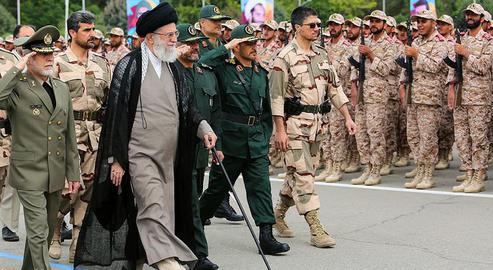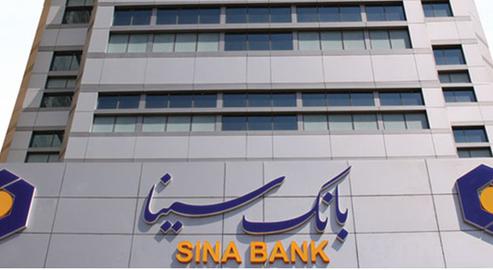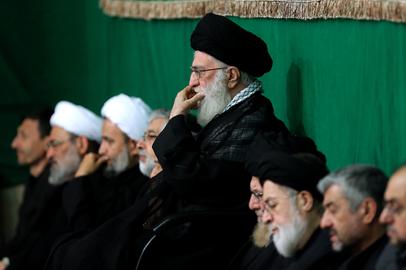In his memoirs, the late president Akbar Hashemi Rafsanjani said the end of the 1980-1988 war between Iran and Iraq left many Iranian fighters and military men “frustrated” because they had not anticipated that the war would end “so soon.”
Iran needed to rebuild after the devastation of eight years of war, to make use of equipment and supplies left over after the conflict and to keep multitudes of demobilized soldiers from roaming the streets with nothing to do. Officials therefore decided to include the Islamic Revolutionary Guards Corps (IRGC) – i.e. the Revolutionary Guards – into development and economic projects. In 1989, Khatam-al-Anbiya Construction Headquarters, which has since become the biggest contractor for government projects, was established by order of Supreme Leader Ayatollah Ali Khamenei.
Rafsanjani, then-president of the Islamic Republic, supported the decision. “The Guards’ military engineering arm had resources from the war that could play an effective role in building the country and, at that time, we gave them projects such as building roads,” he said in 2013. “This was beneficial both to the country and to the Guards.”
These large infrastructure projects – water supply, dam-building, electricity generation, oil and gas export facilities and housing – were contracted out to Khatam-al-Anbiya. They needed precursor resources such as raw materials and heavy industrial equipment. To supply these, the Revolutionary Guards started importing them; to finance their operations, they gradually moved into unrelated businesses such as importing consumer goods and building their own ports. They pursued all this without informing the government. The IRGC then bought factories, established banks and, within three decades, turned into the most powerful financial and economic entity and contractor in Iran. But unlike any normal contractor or conglomerate – this one was armed.
During his presidency, which ran from 1989 to 1997, Rafsanjani was a supporter of the IRGC’s involvement in economic activities. But three decades later he said the Guards would not be happy unless they had the whole country under their sway.
In 2004, a few hours after then-president Mohammad Khatami inaugurated the new Imam Khomeini International Airport in Tehran, the Guards occupied [Persian link] the airport and closed it down, citing security concerns because “foreigners”, a Turkish company, were involved in running the airport. No flights were allowed to take off or land for five days – when it was announced that the contract with the Turkish company had been terminated.
In 2011, the next president, Mahmoud Ahmadinejad, sarcastically called the Guards “brother smugglers” [Persian video] and in 2017 his successor, Hassan Rouhani, said that the IRGC was “a government with guns” that had left no room for competition in the Iranian economy.
Four Iranian presidents were critical of the overwhelming presence of the Revolutionary Guards in Iran’s economy. But none of them could force any changes to serve the public interest.
Now the Guards have the Iranian economy in their grasp. But it is an ailing economy, in crisis, and it must deal with American, European and Canadian sanctions. Whether the Iranian government wants it or not, it is forced to rely on the Guards to acquire essential goods. This paramilitary institution will, as a consequence, play an ever-stronger role in governing the country while even benefiting financially from bypassing sanctions.
What Does the Law Say?
Permission to engage in economic activities is included in the charter [Persian link] of IRGC, approved by Iran’s parliament in 1982. Article 10 of this charter gives the Guards legal authority “to participate in relief operations during disasters and calamities, to perform relief, educational and production services and services for [construction] at the request of the government, with total respect for the rules of Islamic justice in peacetime” provided that the Supreme Council of the Revolutionary Guards ensures that by engaging in these activities the Guards do not lose military preparedness.
Iran’s government has repeatedly asked [Persian link] the IRGC to not force smaller companies – ones that cannot compete with a military-intelligence force – out of the market. Officials have even called on the Guards to cease their economic activities. But not have such calls failed every time, but they exposed the government to a barrage of attacks by the Guards, forcing it to retreat and leading ultimately to an increase in the IRGC’s economic expansion.
Eventually, President Rouhani asked the Guards to take on major projects that the private sector is unable to finance. In effect, the government has accepted that it can neither slow the IRGC’s absorption of Iran’s economy nor force the Guards to confine themselves to just a military mission.
The Guards’ economic activities are not illegal. But while the charter states that these activities are to be pursued “at the request of the government,’ successive governments have failed to supervise or limit the IRGC’s monopolies. The Revolutionary Guards operate under Supreme Leader Ayatollah Khamenei’s supervision, in his role as commander-in-chief of the armed forces, and no institution supervised by him operates in a transparent way. Iran’s parliament has also failed to bring the Guards’ commercial and banking activities into the light.
The Guards’ vast economic, business and financial activities may be murky, their precise extend unknown; but economics and other experts have no doubt that the overwhelming presence of the IRGC in Iran’s economy has put the country’s economic life beyond the possibility of a healthy recovery or eventual normalization.
Experts are often unable to even establish, for a certainty, whether a particular business belongs to the Guards. This lack of transparency means that many private-sector Iranian companies have entered into business arrangements with entities without knowing that they are IRGC-owned firms. The Guards then use these unsuspected private companies to bypass American sanctions. (The US naturally puts all such companies on its sanctions list as soon as they are identified.)
The IRGC also creates shell companies in the United Arab Emirates (UAE), to bypass US sanctions, and turns them into gateways for financial transactions between Iran and the outside world. But when the real identity of these shell companies becomes knows – including financial institutions established by the IRGC largely in Dubai to conduct their transactions –then the activities of private Iranian-owned businesses comes to the attention of the UAE and leads to the shutdown of private Iranian currency exchanges in the Emirates.
The Guards Tighten the Sanctions’ Noose
Less than six months after the US re-imposed sanctions on the Islamic Republic, in November 2018, Iran’s Foreign Minister Mohammad Javad Zarif told parliament that a number of Iranian merchants and money changers in the UAE were in trouble. Many were forced to relocate.
In March 2019, less than three months after pressure on Iranian businesses in the Emirates started, the US Treasury Department added 25 Iranian individual and entities in the UAE and Turkey to its sanctions list because they were fronts for bypassing US sanctions.
“We are targeting a vast network of front companies and individuals located in Iran, Turkey, and the UAE to disrupt a scheme the Iranian regime has used to illicitly move more than a billion dollars in funds,” Treasury Secretary Steven T. Mnuchin said. “The IRGC, MODAFL [Iran’s Ministry of Defense and Armed Forces Logistics organization], and other malign actors in Iran continue to exploit the international financial system to evade sanctions, while the regime funds terrorism and other destabilizing activities across the region.”
Earlier, Iraq’s government had terminated the activities of the Iranian Sina Bank and Bahman Group, an auto manufacturer, in that country after the US sanctioned these companies for recruiting, training and deploying child soldiers on behalf of the Revolutionary Guards.
These sanctions hurt not only Iran’s private sector but also the countries that host private-sector Iranian businesses and money-changers – by creating tensions between the US and host countries.
The IRGC’s deep infiltration into the Iranian economy is making life harder and harder for Iran’s private sector. The Guards’ economic activities lack government’s authorization, and are therefore illegal; they have devastating consequences for the weak and brittle Iranian economy. Iran’s private businesses are the victim of the IRGC’s abuse of private sector shell companies to bypass US sanctions. Undercover and possibly illicit IRGC economic activities have meanwhile heightened tensions and suspicions about Iran’s intentions among its neighboring countries.
In his book, “The Art of Sanctions”, Richard Nephew — responsible for the development and execution of US sanctions strategy for Iran for the American National Security Council (NSC) from 2011 to 2013, a playbook the Trump Administration also follows — wrote that before the 2015 nuclear agreement and before nuclear-related sanctions were lifted, Iran bypassed sanctions to procure what it wanted by using brokers and finding new ones when previous agents became useless. Larger sectors of the Iranian economy therefore fell into the trap of sanctions. In other words, Nephew said, it was Iran itself that prepared the ground for the expansion of sanctions on the Iranian economy.
With the new round of sanctions following President Trump’s withdrawal from the nuclear agreement, the destructive consequences of the Guards’ bypassing sanctions through the private sector, and of IRGC’s economic stranglehold on the Iranian economy, is becoming more and more visible.
Related Coverage:
IranWire's Revolutionary Guards infographic
IranWire's Revolutionary Guards interactive diagram
New Guards Commander: More Missiles and a More Hawkish Approach, April 23, 2019
How Will Listing the Guards as a Terrorist Organization Change Iran?, April 19, 2019
Iran used Red Crescent as Cover for Revolutionary Guards, April 17, 2019
Trump Designates Revolutionary Guards a Terrorist Organization, April 10, 2019
The IRGC Commercial and Financial Institutions: Khatam-al-Anbiya Construction Headquarters, April 9, 2019
The Islamic Revolutionary Guards Corps: Structure and Missions, April 9, 2019
The IRGC Security and Intelligence Agencies, April 9, 2019
The IRGC Ground Forces, April 9, 2019
The IRGC Quds Force, April 9, 2019
The IRGC Navy, April 9, 2019
The IRGC Aerospace Force, April 9, 2019
visit the accountability section
In this section of Iran Wire, you can contact the officials and launch your campaign for various problems


























comments